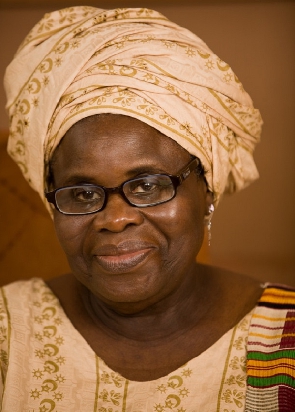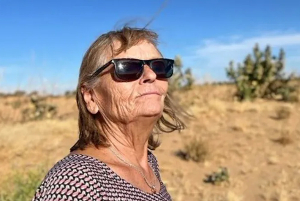Professor Ama Ata Aidoo, distinguished, award-winning author, playwright,
poet, feminist and academic, fondly known as ‘Auntie Ama’ to members of the
Ghana Association of Writers (GAW), died in Accra on May 31, 2023, aged 81.
Such was her standing, that whenever she was able to attend a GAW event, her
presence gave the occasion an almost palpable ‘feel-good’ atmosphere.
Walking down memory lane, I recalled an unusual incident in 2016 involving Prof
Aidoo which caused a big stir. It was a minor yet significant occurrence which
made headlines because of the strong stand she took, a demonstration of admirable meticulousness.
Undoubtedly, it spoke volumes about her character, values, principles and
insistence on standards. She was also known for her passionate views on how
Africa was short-changed by colonialism.
Not surprisingly, news of her passing has echoed around the world, both in
electronic and print media, with glowing tributes.
The following is abridged from the article I wrote in The Mirror weekly about that 2016 incident under the headline ‘The Professor’s protest action’:
Perhaps it’s mostly those who, like me, are constantly having to correct
people’s spelling of their name who can fully appreciate Professor Ama Ata
Aidoo’s recent protest action in response to the wrong spelling of her middle
name, which continues to be a talking point.
On September 5 (2016), the Ghanaian Times reported her protest with a front page
banner headline, “Poet Laureate Storms Out Of Event" … Over wrong spelling of her name”.
The report said: “An event organised to celebrate renowned Ghanaian writer,
Professor Ama Ata Aidoo, for her contribution to literature in Ghana, went sour on Saturday when she walked out of the programme.
“This was because both the banner and the programme cover had her name wrongly
spelt … as ‘Ama Atta Aidoo’, instead of Ama Ata Aidoo.”
The award ceremony, for winners of a short story competition, was organised by
the Centre for Gender Studies and Advocacy (CEGENSA) of the University of
Ghana (UG). When Prof Aidoo arrived at the venue and saw her name wrongly spelt, “the Ghanaian Times saw her confront the organizers on the error and then
walk back to her car and was driven away.”
In the September 15 issue of the Times, Professor Audrey Gadzekpo who
moderated the event, shared her thoughts on the controversy. She wrote: “I do not think Prof Ama Ata Aidoo is wrong in taking a public stand on this matter.”
She said she was told that the misspelling was done by the printers “who had
erroneously assumed …that what had been submitted to them – Ata – was wrong”
and made it ‘Atta’.
Prof Gadzekpo explained that the organisers of the event immediately “accepted
responsibility and apologized profusely. They went as far as kneeling down to beg, a sign of contrition in our culture.”
Also, she acknowledged that “having at the last minute discovered the misprint they should not have used the banner or programme.”
However, Prof Gadzekpo’s article made it clear that in her view, Prof Aidoo had
been too sensitive. It suggests that not only should Prof Aidoo have been big-
hearted, she should also have seen the bigger picture: “By choosing not to be
magnanimous to her allies in the feminist struggle during their moment of
weakness, she also let down the top winners, all female,” of the writing competition organised in her honour.
In my opinion, both Prof Aidoo’s apparent fury and Prof Gadzekpo’s regret for the missed opportunity for CEGENSA and the winners are understandable. But that
leaves the main culprits scot-free: The printer/designer who added the extra ‘t’, and the one who took delivery of the items.
How can a printer make a change to text submitted by a customer, even if it’s only a comma placement, without first checking with that client?
And why would a client who has commissioned a printing job on receiving it not
check it against the original order?
Furthermore, the organizers noticed the mistake “at the last minute”, but decided to use the banner and the programme anyway.
I believe that it is this unacceptable attitude of, seemingly, ‘it doesn’t matter’, even when it has to do with the main name on publicity material for such an important occasion, that Prof Aidoo’s protest was meant to highlight.
Unfortunately, many people in this country see the wrong spelling of someone’s
name as ‘no big deal’.
For instance, although banks are annoyingly meticulous when a customer is
presenting a cheque for payment, they themselves are not always so efficient! A
number of times in this country I have had to reject a new ATM card because my
name was wrongly written – strangely, spelt differently from the expired card it was replacing!
I do confess to having almost an obsession about people getting names correct,
especially mine! I usually joke that my name is the one thing that truly belongs to me so it should be written the way I want it!
Of course we all make mistakes. And those of us whose livelihood is linked to
publications know too well how easy it is to make mistakes in writing.
Hopefully, Professor Ama Ata Aidoo’s memorable protest action will serve as a
constant reminder to all of us, writers and those who produce printed matter, of the need to constantly double-check – and consult with the client.
(‘The Professor’s protest action’, was published in the September 23, 2016 issue
of the Mirror.)
Auntie Ama, may the earth rest lightly on you.
Opinions of Monday, 5 June 2023
Columnist: Ajoa Yeboah-Afari
Remembering Professor Ama Ata Aidoo, our ‘Auntie Ama’
Entertainment














